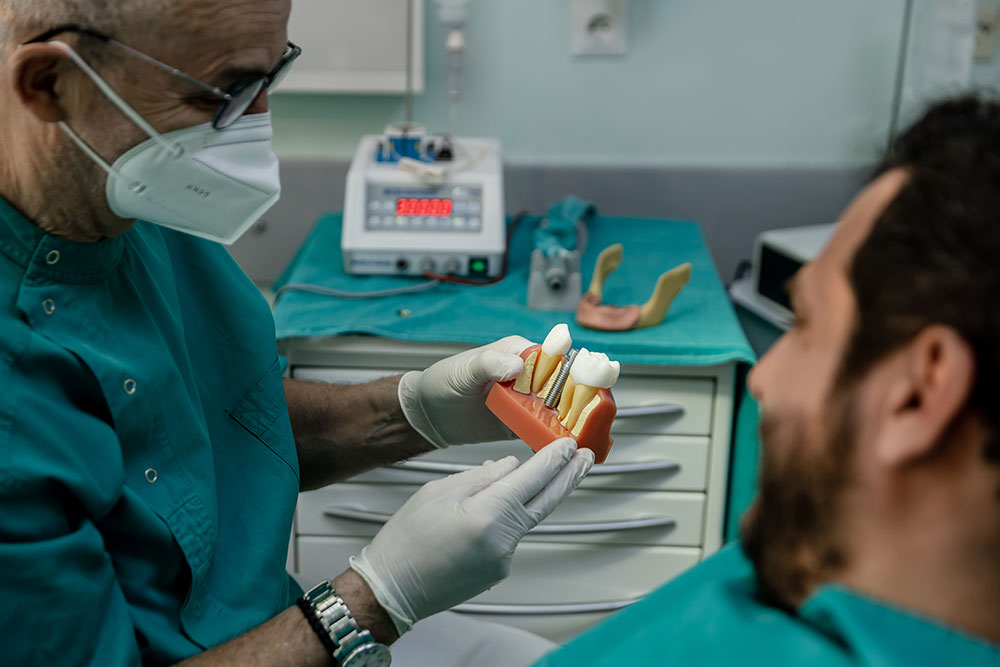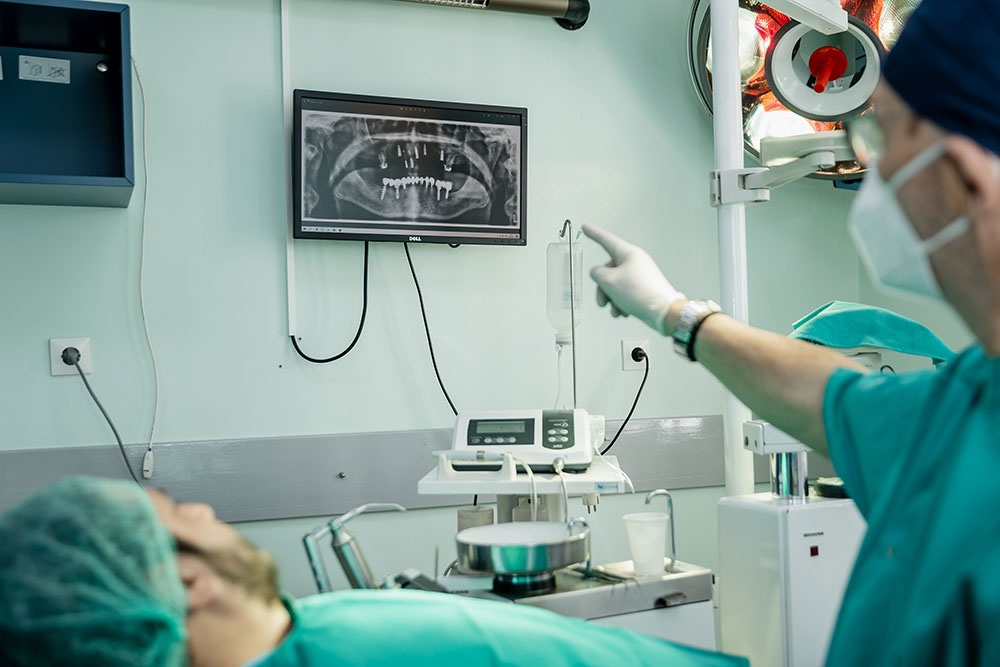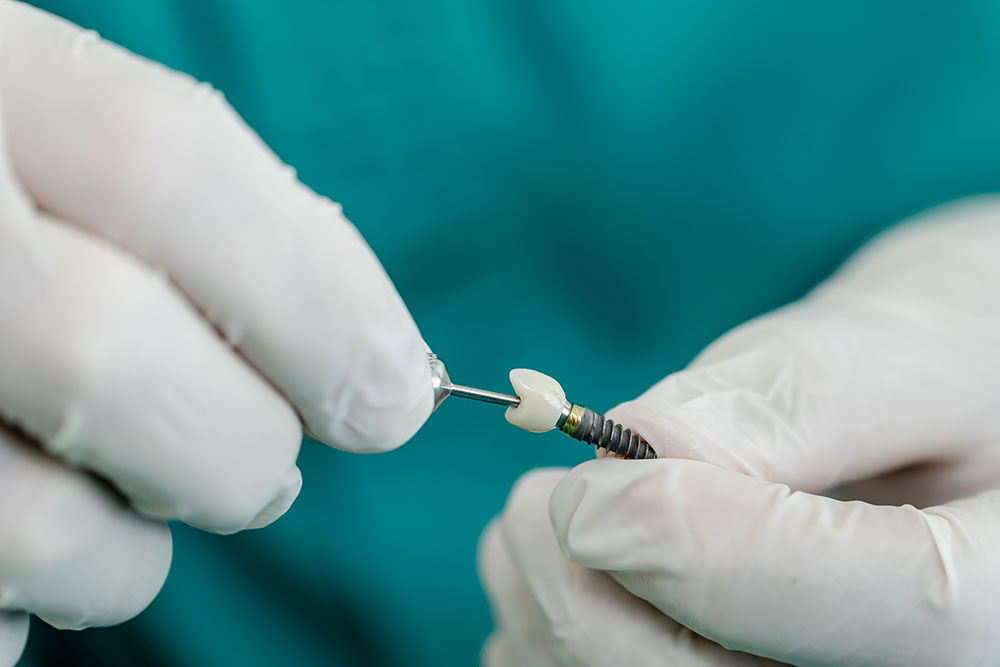Dental implants
Dental implants are an increasingly popular method of replacing lost teeth. These purpose-built prosthetic restorations have multiple qualities. Their main advantage is that they look completely natural, and the feeling when chewing, speaking and laughing is like when the natural teeth were in place.
Is it correct to say "tooth implant" or "dental implant"?
In dental circles and in public, both forms, “dental implant” and “tooth implant,” are used equally. Therefore, you won’t go wrong by choosing one or the other, even if you use them interchangeably.
What are dental implants and what are their characteristics?
Dental implants are special screws (sometimes cylinders), which are screwed into the jawbone. Implants can be installed either in the upper jaw (maxilla) or in the lower (mandible).
Most dental implants are made of the precious metal titanium, which does not show a tendency towards contraindications due to its high biocompatibility.
This characteristic means that the human body accepts it very well – it does not reject it in more than 95% of cases. The titanium implant grows well with the bone and this process is called osseointegration.

Are there other types of dental implants other than titanium?
For patients who for some reason do not want the presence of metal in their body or are allergic to titanium, modern technology has made it possible to construct zirconium oxide implants.
Dental implants and their primary purpose
The main purpose of dental implants is to install them in the jawbone in place of one or more missing teeth. Installed in this way, dental implants imitate the natural root of the tooth, successfully replacing it completely.
What can be caused by the lack / loss of teeth - Indications for placing dental implants?
Lack / loss of teeth can be caused in several ways. Some of them are:
- natural lack of teeth (absence of permanent teeth);
- trauma (a blow in sports, a fight or a fall);
- disease of the teeth and jaws (periodontal disease, infection, cyst, tumor, caries, etc.).
Fortunately, teeth lost due to congenital abnormalities, traumatic outbreaks or diseases can be replaced with dental implants with great success.
Which specialists are qualified to perform dental implant placements?
Dental implant surgery belongs to the scope of specialists in oral surgery and implantology.
At the Dr. Veselinović Dental Clinic, implantologists with four decades of experience and enviable knowledge are practicing, thanks to which they can respond to every challenge that implant-prosthetic therapy sometimes brings.
They gladly share their years of experience and knowledge with younger colleagues, always available to assist. The most telling testament to the quality of work by implantologists at our clinic is the satisfaction of our clients.
Application of anesthesia in implantology
Implantological intervention is most often performed under local anesthesia. However, there are situations in which other types of anesthesia are applicable. All of them have the function of blocking pain centers in the brain and providing maximum comfort for the patient.
Analgosedation (state of semi-consciousness) is used if the patient has a strong fear, so much so that it can interfere with the intervention (panic attacks, urge to vomit, sweating, etc.). If the patient is a person with disabilities in psychophysical development, intravenous analgosedation is also usually applied.
General or total anesthesia (narcosis) is another way to facilitate the procedure of installing dental implants for these patients. During the duration of this anesthesia, the patient is in a state of sleep.
Both of these types of anesthesia are injected by a specialist anesthesiologist.
How dental implants are installed ?
As already mentioned, a dental implant is a metal screw that, like a post, replaces a lost dental root.
The implant installation procedure takes place in several stages:
- STAGE: After cutting the mucoperiosteum (gum) and reaching the alveolar bone, the implant bed is made with a profiled drill.
- STAGE: Screwing in the dental implant with a special instrument (it takes about 10 minutes for each implant).
- STAGE: Setting the gingivoformer (abutment) and taking of mold at least 3–4 months after osseointegration. The function of the abutment is to support the healing of the soft tissue around the implant and to serve as a link between it and the prosthetic restoration.
- STAGE: Trial of the metal or zirconium skeleton of the future dental restoration.
- STAGE: Final work – cementing or screwing the completed prosthetic work.
What prosthetic restorations can be placed on dental implants?
Depending on the number of teeth being replaced, but also on the condition of the jawbone, dental implants are the carriers of the following prosthetic replacements:
Today, these suprastructures are made in two forms, such as:
- metal-ceramic;
- metal-free (zirconium).
Gold crowns, once very popular, are rarely asked for, today
Crowns on implants
Crowns are placed on implants that replace individual teeth.
Bridges on implants
Dental implants can be the carriers of bridges if it is necessary to replace 2 or more teeth.
Prosthesis on implants
Total prostheses on implants are a more economical form of prosthetic rehabilitation for completely edentulous patients. These systems are known as all-on-4 or all-on-6 because they involve the placement of four or six implants in the completely edentulous jaw.

Dental implants - Advantages compared to classic dentures
The primacy of dental implants in relation to a classic prosthesis is multiple:
- Permanent solution – The lifetime of implants is much longer than a classic prosthesis.
- Comfort and natural look and feel – Classic prosthesis. cause gum irritation in many patients and become uncomfortable for them to wear. In addition, they feel insecure because it can fall out when eating, talking or laughing. With implants, there are no such problems.
- No teeth grinding – Installing implants excludes the need for grinding and destroying healthy adjacent teeth.
- Better appearance –Due to the loss of teeth, there is resorption (reduction in volume) of the jaw bone and disturbances in the middle and lower part of the face. This affects the creation of an unpleasant impression of aging. Dental implants can stop that process.
- Stabilization of prostheses – Implant systems can serve as stabilizers of total prostheses. In case of loss of all teeth (more often in the lower jaw), implants are placed in the front jaw area to prevent the prosthesis from falling out.
Contraindications after teeth whitening treatment are almost non-existent, so there is no reason for any fear whatever method the patient chooses. How long the whitening effects will last depends on the patient’s own habits. If he regularly maintains oral hygiene and avoids smoking and consumption of colored drinks, it will last longer.

Is it necessary to carry out certain preparations before installing dental implants?
At the first dental examination, and after imaging the teeth and jaws by orthopantomography in our X-ray room, the problem will be diagnosed and the best implant-prosthetic therapy will be suggested. In some patients, some other interventions need to be performed before the implant procedure.
Due to the effect of various factors, sometimes the condition of the jaws, mandibular nerve, and maxillary sinus does not allow the installation of dental implants. An oral surgery and implantology specialist will apply one of the following operations in a given case:
- sinus lift (raising the bottom of the maxillary sinus);
- lateralization of the nerve (lateral movement of the mandibular nerve);
- extension of soft tissues and jawbone augmentation.
All these operations, in order to ensure the conditions for the installation of implants, are very successfully performed at the Dr. Veselinović Dental Clinic.
Which dental implants are the best?
In our clinic, only dental implants of proven quality, manufactured by reliable global manufacturers, are used such as following.
They are:
The properties and prices of the implants of these brands are such that each patient, according to his wishes and possibilities, will choose what is most suitable for him.

